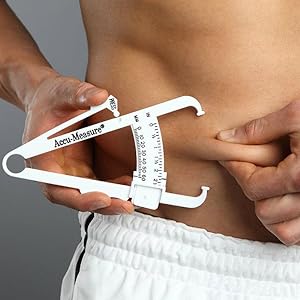Amy Stephens
MS, RDN, CSSD, CEDS
Licensed dietitian
specializing in sports nutrition
and eating disorders
MS, RDN, CSSD, CEDS
Licensed dietitian
specializing in sports nutrition
and eating disorders
TW: This content mentions eating disorders and body image.
Body composition testing offers a window into the intricate components that constitute our bodies. It surpasses simple weight measurements by evaluating the distribution and proportion of tissues like fat mass, muscle mass, and bone density, providing a detailed profile of physical makeup.

Skinfold assessment using calipers
There are a few different ways to measure body composition:

Dual-Energy X-Ray Abroptiometry (DEXA scan)
Body fat and its impact on athletic performance
Some sports emphasize the relationship between reduced body fat levels and improved athletic performance. For the majority of athletes, physical appearance does not influence scoring or competition outcomes. Athletes who are frequently featured on social media may feel compelled to achieve a specific physique, which can result in unnecessary stress and pressure, potentially leading to eating disorders among both male and female athletes.
It’s important to point out that each person has a genetically determined amount of body fat that is unique to them. When athletes strive to lower their body fat below their natural range, it can have adverse effects on their performance, general health, and mental well-being. This can also lead to disruptions in hormones, increased fatigue, susceptibility to injuries, and a compromised immune system. Athletic performance is influenced by a multitude of factors beyond body composition, including genetics, diet, rest, resilience, hydration, overall health, mental attitude, and more.

When Body Composition Testing Could Be Helpful
For endurance athletes, especially those prone to injuries or with low bone density, body composition testing can be valuable. Body composition and fat testing can be helpful to determine if body fat is too low to support proper functioning. It offers insights into muscle mass and overall body composition, aiding in tailored training and injury prevention strategies.
Beneficial Scenarios for Body Composition Testing:
When Body Composition Testing Isn’t Helpful
The introduction of mandatory body composition testing in collegiate settings has raised concerns. It can feel invasive and exacerbate body image issues, potentially leading to eating disorders among athletes. These psychological challenges can detract from performance by causing fatigue due to inadequate nutrition and increasing injury risks. Rather than focusing on achieving a specific body fat, a great way to improve performance is to focus on overall nutrition and health. Knowing your body fat percentage is just a small part of understanding athletic performance; it is not everything.
Frequent body composition testing may not offer additional benefits for individuals already maintaining health through exercise and balanced nutrition. Collegiate and high-performing athletes, already under significant physical stress, may not need the added pressure of constant body fat monitoring, as its impact on performance is marginal compared to other training factors.
Scenarios Where Testing Is Not Beneficial:
○ Healthy individuals with consistent exercise and nutrition routines.
○ Athletes susceptible to body image issues or eating disorders, where testing could worsen these conditions.
In summary, while body composition testing can enhance training precision and injury prevention for athletes, its application should be mindful of potential psychological impacts. Prioritizing factors like hydration, sleep, and diet remains fundamental to improved performance. For those genuinely interested in understanding their body’s composition, exploring such testing can offer insightful perspectives but should be approached with consideration of individual needs and well-being.
Alternative Metrics Influencing Sports Performance
Several metrics influence sports performance without necessitating body composition testing:
By focusing on these aspects, athletes can optimize performance and well-being without the potential drawbacks of intensive body composition testing. Body composition testing serves as a powerful tool in the realm of sports science, yet its implementation requires careful consideration of both physiological benefits and psychological impacts on athletes.
References
Beestone C. Body composition testing. Science for Sport. March 1, 2024. Accessed July 8, 2024.
https://www.scienceforsport.com/body-composition-testing/.
Kuzma C. Body composition testing – college running programs moving away from body comp tests. Runner’s World. Accessed July 19, 2024. https://www.runnersworld.com/news/a42437488/body-composition-testing-colleg e-programs/.
Mathisen TF, Ackland T, Burke LM, et al Best practice recommendations for body composition considerations in sport to reduce health and performance risks: a critical review, original survey and expert opinion by a subgroup of the IOC consensus on Relative Energy Deficiency in Sport (REDs) British Journal of Sports Medicine 2023;57:1148-1160. https://bjsm.bmj.com/content/57/17/1148
Strout E. Why top NCAA triathlon coaches won’t use body composition testing. Triathlete. January 5, 2023. Accessed July 8, 2024. https://www.triathlete.com/culture/news/why-top-ncaa-triathlon-coaches-wont-use -body-compos ition-testing/.
Body composition: UC Davis Sports Medicine: UC Davis health. Body Composition | UC Davis Sports Medicine |UC Davis Health. Accessed July 19, 2024.
Licensed dietiTian
specializing in sports nutrition and eating disorders
© Amy Stephens Nutrition
SITE BY 744 CREATIVE